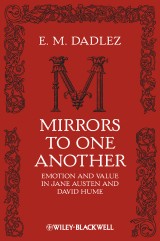Details

Mirrors to One Another
Emotion and Value in Jane Austen and David HumeNew Directions in Aesthetics, Band 10 1. Aufl.
|
27,99 € |
|
| Verlag: | Wiley-Blackwell |
| Format: | |
| Veröffentl.: | 30.03.2009 |
| ISBN/EAN: | 9781444310405 |
| Sprache: | englisch |
| Anzahl Seiten: | 256 |
DRM-geschütztes eBook, Sie benötigen z.B. Adobe Digital Editions und eine Adobe ID zum Lesen.
Beschreibungen
A compelling exploration of the convergence of Jane Austen’s literary themes and characters with David Hume’s views on morality and human nature. <ul> <li>Argues that the normative perspectives endorsed in Jane Austen's novels are best characterized in terms of a Humean approach, and that the merits of Hume's account of ethical, aesthetic and epistemic virtue are vividly illustrated by Austen's writing.</li> <li>Illustrates how Hume and Austen complement one another, each providing a lens that allows us to expand and elaborate on the ideas of the other</li> <li>Proposes that literature may serve as a thought experiment, articulating hypothetical cases which allow the reader to test her moral intuitions</li> <li>Contributes to ongoing debates on the philosophy of literature, ethics, and emotion</li> </ul>
Preface. <p>1. How Literature Can Be a Thought Experiment: Alternatives to and Elaborations of Original Accounts.</p> <p>2. Literary Form and Philosophical Content.</p> <p>3. Kantian and Artistotelian Accounts of Austen.</p> <p>4. Hume and Austen on Pleasure, Sentiment, and Virtue.</p> <p>5. Hume and Austen on Sympathy.</p> <p>6. Hume's General Point of View and the Novels of Jane Austen.</p> <p>7. The Useful and the Good in Hume and Austen.</p> <p>8. Aesthetics and Humean Aesthetic Norms in the Novels of Jane Austen.</p> <p>9. Hume and Austen on Good People and Good Reasoning.</p> <p>10. ‘Lovers,' ‘Friends,' and other Endearing Appellations.</p> <p>11. Hume and Austen on Pride.</p> <p>12. Hume and Austen on Jealousy, Envy, Malice and the Principle of Comparison.</p> <p>13. Indolence and Industry in Hume and Austen.</p> <p>14. What Hume’s Philosophy Contributes to Our Understanding of Austen’s Fiction; What Austen’s Fiction Contributes to Our Understanding of Hume’s Philosophy</p>
<p>"Dadlez unpacks the major philosophical trends evident in both Austen and Hume to show that Austen's works were influenced by the intellectual climate resulting from Hume's studies." (<i>Consciousness, Literature and the Arts</i>, December 2009)</p> <p>"Dadlez says explicitly that her argument is intended to be cumulative: that is, the text reveals the posited relationship between Hume and Austen gradually, through a series of smaller demonstrations as she moves from topic to topic. This makes her book an extremely pleasant read for an Austen aficionado.... Indeed, that the book's strength lies in the details... suggests that it will be of particular value in interdisciplinary contexts: it has the double function of introducing Austen and her literature to philosophers, and Hume and his moral philosophy to students of literature." (<i>Notre Dame Philosophical Reviews</i>, February 2010)</p>
<b>E.M. Dadlez</b> is Professor of Philosophy at the University of Central Oklahoma. She has published in the <i>Journal of Aesthetics and Art Criticism,</i> the <i>British Journal of Aesthetics, Philosophy and Literature,</i> and <i>Hume Studies.</i> She is also the author of <i>What's Hecuba to Him?</i> <i>Fictional Events and Actual Emotions</i> (1997).
With their timeless observations of human nature, the novels of Jane Austen continue to resonate with modern readers. Austen's accessibility to diverse audiences in divergent periods is due at least in part to her moral perspicacity. In this thought-provoking study, E.M. Dadlez argues that perspectives on value and ethical reasoning expressed in Austen's work converge with views concerning human nature and morality put forward by David Hume. Dadlez maintains that Austen's novels provide us both with thought experiments and outright illustrations that support or demonstrate particular points which Hume himself made about moral reasoning, and about aesthetic and epistemic norms. If so, we can claim for Hume’s ethics, and for some of his philosophy of mind and epistemology and aesthetics as well, the same universality and breadth of accessibility that is ascribed to Austen. And while Austen can sometimes help us to understand and to expand upon Hume, it is also the case that Hume can help us to understand and to expand upon Austen, by making salient features of her texts that are too often neglected.
<p>"Dadlez's treatment of moral and other philosophical themes in Austen is subtle and enlightening, and the connections she draws between the great author and Hume are perceptive and convincing. Because of its interdisciplinary breadth and shrewdness about both literature and philosophy, this book will speak to a very wide audience."<br />—<b>A.W. Eaton, University of Illinois at Chicago</b></p> <p>"This sprightly, affectionate book makes a compelling case that Austen's novels both endorse a Humean conception of ethical life and elicit emotional responses that enact that conception from readers."<br />—<b>Rachel Zuckert, Northwestern University</b></p>

















